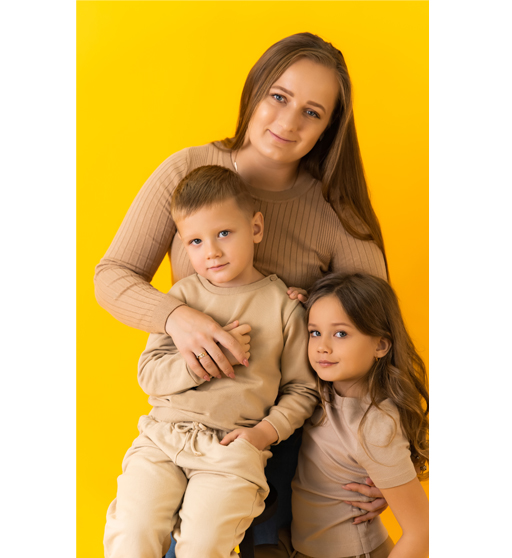1.1 Natalka and her family
Let’s start by reading this small text. Natalka, the girl in the photo, introduces herself and her family. Read what she says in Ukrainian or in transliteration and then listen to the recording.
Transcript: Audio 1
Tse ya. Mene zvut Natalka. Ya shkoliarka. Tse Artem. Vin mii brat. Vin tezh shkoliar. Tse nasha mama, yii zvut Iryna. Vona medsestra. Nash tato Oleksandr – likar. Vin zaraz v Ukraini, a my – mama, Artem i ya – v Anhlii.
| Ukrainian | Transliteration |
|---|---|
| Це я. Мене звуть Наталка. Я школярка. Це Артем. Він мій брат. Він теж школяр. Це наша мама, її звуть Ірина. Вона медсестра. Hаш тато Олександр – лікар. Він зараз в Україні, а ми – мама, Артем і я – в Англії. | Tse ya. Mene zvut Natalka. Ya shkoliarka. Tse Artem. Vin mii brat. Vin tezh shkoliar. Tse nasha mama, yii zvut Iryna. Vona medsestra. Nash tato Oleksandr – likar. Vin zaraz v Ukraini, a my – mama, Artem i ya – v Anhlii. |
Transcript: Audio 2
Take a closer look (Audio 2 transcript)
Let’s look closely at this short text. Let me remind you first one grammar peculiarity which you learnt during week 1: in Ukrainian verb ‘to be’ is usually avoided in present tense. So, the text starts with the sentence Tse ya, which means ‘This is me’. Then the speaker introduces herself: Mene zvut Natalka. Ya shkoliarka, which, as you know, means ‘My name is Natalka. I am a schoolgirl.’ She continues: Tse Artem. Vin mii brat. Vin tezh shkoliar, which means ‘This is Artem. He is my brother.
He is also a schoolchild.’ Word vin means ‘he’, brat means ‘brother’. mii is masculine form of ‘my’. Please repeat these words: vin, mii. Natalka continues talking about her family: Tse nasha mama, yii zvut Iryna. Vona medsestra. I hope you have guessed the meaning: ‘This is our Mum, her name is Iryna. She is a nurse.’ Obviously, mama means ‘Mum’, nasha is ‘our’ (feminine form), yii zvut Iryna means ‘her name is Iryna’. Vona means ‘she’. Please repeat the pronouns ‘he’ and ‘she’: vin, vona. The girl continues her story and she talks about their father: Nash tato Oleksandr - likar. It means ‘Our dad Oleksandr is a doctor’. Nash is masculine form of the word ‘our’. Last sentence is Vin zaraz v Ukraini, a my – mama, Artem i ya – v Anhlii. It means ‘He is now in Ukraine, and we – mum, Artem and me – in England’. New important words here are zaraz (‘now’) and my (‘we’). Please repeat them after me: zaraz, my. If you listen to the last sentence attentively you will notice that words Ukraina and Anhliia (Ukraine and England) have different ending (-i): Ukraini, Anhlii. Ukrainian is one of the languages in which endings of the words are regularly changed in sentences. Since you are complete beginners, don’t worry much about endings and try hearing the stem of the words and guess their meaning.
Activity 1: Who is where?
Now match the occupations to the person’s name:
Using the following two lists, match each numbered item with the correct letter.
-
школярка shkoliarka
-
школяр shkoliar
-
медсестра medsestra
-
лікар likar
Match each of the previous list items with an item from the following list:
a.мама Ірина mama Iryna
b.тато Олександр tato Oleksandr
c.брат Артем brat Artem
d.Наталка Natalka
- 1 = d,
- 2 = c,
- 3 = a,
- 4 = b
Answer
The matching pairs are:
школярка shkoliarka (school girl) / Наталкa Natalka
школяр shkoliar (school boy) / брат Артем brat Artem
медсестра medsestra (nurse) / мама Ірина mama Iryna
лікар likar (doctor) / тато Олександр tato Oleksandr

